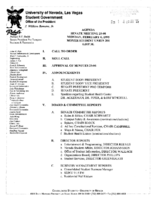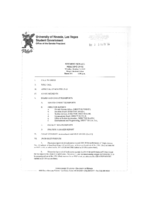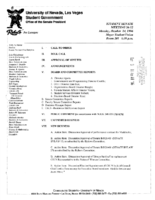Search the Special Collections and Archives Portal
Search Results
Kendall Stagg Collection
Identifier
Abstract
The Kendall Stagg Collection (1998-2000) consists of material documenting Kendall Stagg’s political races in northern Nevada and also details gay activism in Reno. The collection consists of Stagg campaign materials, a t-shirt from one of his campaigns, and documents pertaining to the Gay, Lesbian, and Bisexual Student Union at the University of Nevada, Reno and Gay Pride parade organizing in Reno.
Archival Collection
Robert H. Crabtree papers, 1920 to 1999
Level of Description
Scope and Contents
The Robert H. Crabtree papers (1920-1999) sub-series contains an extensive account of Crabtree's career as a professor and archaeologist. Materials includes correspondence, photographic prints and negatives, reports, and notes of archeological surveys and excavations done in Southern California, Southern Nevada, Washington, Oregon, and Mexico. Collection includes resources such as field catalogs, proposals, newsletters, annual reports, workflow documentation, conference materials, and meeting minutes from various archaeological and anthropological societies and organizations. The subseries also includes class notes, dissertation drafts, and manuscripts used by Crabtree during his academic career. Digital files include field notes and reports.
Archival Collection
Collection Name: Elizabeth von Till and Claude N. Warren Professional Papers
Box/Folder: N/A
Archival Component

Meeting minutes for Consolidated Student Senate University of Nevada, Las Vegas, January 30, 1995
Date
Archival Collection
Description
Text

Meeting minutes for Consolidated Student Senate University of Nevada, Las Vegas, October 09, 1995
Date
Archival Collection
Description
Text

Meeting minutes for Consolidated Student Senate University of Nevada, Las Vegas, October 14, 1996
Date
Archival Collection
Description
Text

Contract, Instrument transferring interests in real and personal property, Las Vegas Land and Water Company, Audit No. 5351, June 1, 1954
Date
Archival Collection
Description
Release of all rights, licenses, leases, contracts, etc., of the Las Vegas Land and Water Company to the Las Vegas Valley Water District. Notarized by Louis Scholnick in Douglas County, Nebraska on June 3, 1954.
Text

Meeting minutes for Consolidated Student Senate, University of Nevada, Las Vegas, March 20, 1979
Date
Archival Collection
Description
Text

Transcript of interview with Darrin Bush by Claytee White, June 30, 2016
Date
Archival Collection
Description
In 1948 in Las Vegas, Nevada, a camera-girl-turned-cocktail-waitress and a casino credit manager welcomed the birth of their son, Darrin Bush. After attaining his education at St. Joseph’s Catholic School and Bishop Gorman High School, Bush earned his Bachelor’s degree in journalism at the University of Nevada, Reno. Bush credits his love for photography to his mother’s influence and his study of journalism. Bush’s first job after college as a room service waiter at the Sahara Hotel eventually grew into the coveted position of room service swing captain. His swing shift duties included the entertainers' dressing rooms, which meant taking care of the entertainers, getting them what they needed, and stocking their favorite foods and drinks nightly. Through his work, Bush eventually formed close friendships with several celebrities of the day. He enjoyed his work, but he never stopped honing his skills as an amateur photographer. In the mid-1980s, Bush left the Strip to become a professional photographer for the Las Vegas News Bureau. Throughout his News Bureau career, Bush photographed the casino buildings made famous by Las Vegas-the construction and the architecture of Southern Nevada’s gaming palaces-as well as iconic events in Las Vegas history. Darrin retired from the News Bureau in about 2014, but his work recording the building of and events of Las Vegas lives on in the News Bureau archives. He continues to be an avid photographer.
Text

Transcript of interview with Roger Thomas by Stefani Evans and Claytee D. White, August 31, 2016
Date
Archival Collection
Description
As he reveals in this oral history, Roger Thomas is, among many other things, a son, a father, a brother, a husband, a student, an artist, a visionary, and a philanthropist. As the second son of Peggy and E. Parry Thomas’s five children, Roger was raised a Mormon child of privilege and civic responsibility. The banking family summered in Newport Beach, wintered in Sun Valley, and taught their children by words and deeds that it is not up for debate if you will be involved in your community; the only question is how you will apply your talents and resources to benefit your community. Roger absorbed the lessons well. As a child who struggled in school but excelled in art, he attended his last two years of high school at Interlochen Arts Academy, graduating in 1969, finally finding himself “in an environment where what I did had currency.” From there he earned his BFA from the School of the Museum of Fine Arts Boston and Studio Degree from Tufts University before returning to Las Vegas and eventually joining Steve Wynn’s team in 1981. As Executive Vice President of Design for Wynn Design & Development, he is the man in whom Steve Wynn places his trust to make real at each Wynn property the Wynn design philosophy: aim for a constituency of highly sophisticated, well-traveled, very educated people and give them a reality, a now, that is so fetching, so alluring they wish to be no place else. As he was mentored by his father and Steve Wynn, he too is mentoring those who will follow him. At Wynn, the next generation will carry forward the Wynn idea of evoca-texture, of creating “moments of experiential emotion that result in a memory so captivating and so unique that if you want to repeat that you have to come back.” At home, he collaborates with his daughter on a children’s book that has the potential to become a series; she is the illustrator, while he provides the words. Roger Thomas sat for this interview five days after his father, E. Parry Thomas, passed away in Idaho. Instead of postponing the interview to a more convenient time, Roger kept the appointment and explained, “This is for UNLV. If I’d cancelled my father would have killed me.”
Text

Transcript of interview with Brian Cram by Stefani Evans and Claytee White, October 28, 2016
Date
Archival Collection
Description
Throughout his career, former Clark County School District Superintendent (1989–2000) Brian Cram took his father's words to heart. He heard them repeatedly over the years as he watched and later, helped, his father clean classrooms at Robert E. Lake Elementary School: this place—the classroom—this is the most important place. Cram was born in Caliente, where his father worked on the railroad. In 1939, when Cram was a toddler, the family moved to Las Vegas and his father found work first as a sanitation engineer at a hospital, and then at CCSD as a custodian. The elder Cram, who spent his formative years in the Great Depression, prided himself on doing "good, honorable work" as a custodian, because the work—the classroom—mattered. Even so, he wanted more for his son. Cram largely ignored his father's advice during his four years at Las Vegas High School, where he ran with The Trimmers car club, wore a duck tail and a leather jacket, and copped an attitude. Cram's swagger, though, d
Text
